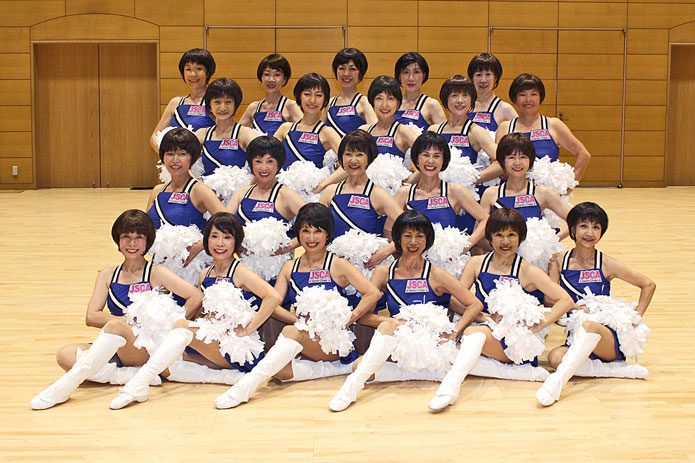
The old adage “You’re only as old as you feel” got put to the test recently when the Nikkei Marketing Journal ran a front-page story on 19 September to coincide with the Respect for the Aged Day national holiday. To drive its point home, the publication ran a photo of Team JSCA (Japan Senior Cheer Association), a young-at-heart troupe of women, the oldest member of which is 73, cavorting in cheerleader costumes and waving white pompoms.
The front-page article ran the results from a survey of 518 men and women between the ages of 65 and 79, which was conducted by Macromil on 31 August–1 September.
When the Nikkei Marketing Journal asked subjects how they felt relative to their actual age, 21.4% said they felt their age. In contrast, the largest response, with 33.4%, was that they felt 10 years younger, while 28.8% claimed to feel five years younger than their actual age. Other replies included 15 years younger (6.2%); 20 years younger (5.2%); and 25 years younger (2.1%). Only 2.9% said they feel older than they are. When asked about their greatest concerns or anxieties, 78.2% of respondents said health and illness topped their list.
Queried about their most frequent expenditures, replies included daily living necessities (46.5%); travel (46.5%); recreation and hobbies (34.7%); and buying things for grandchildren (14.3%). A surprisingly high 93.2% owned a computer, 21.4% a smartphone and 16% a tablet computer, with 54.1% saying they shopped via the Internet (while 38.2% had made ticket purchases or reservations online).
Asked what type of retailers they regularly visit, the top response was convenience stores, with 43.6%, followed by department stores, and their delicatessens in particular (30.3%).
This was borne out by a separate survey by 7-Eleven Japan, which found that, as opposed to only 9% in 1989, seniors in 2015 accounted for 33% of all customers. During the same period, the percentage of patrons under the age of 20 declined from 27% to 6%.
Early adopters
While much Japan coverage is devoted to its rapidly ageing society, on 21 September the Tokyo Shimbun chose to report on the activities of firms and establishments in Kawasaki City’s Miyamae Ward. There, 33 firms in and adjacent to the district—including a chiropractor and motorcar dealer—have posted distinctive green stickers that identify them as supporters of people bringing up babies. Establishments displaying the sticker warmly welcome young mothers pushing a pram, and some, where practical, also provide hot water for warming up bottles of formula.
Aware that Miyamae Ward is home to many young families, a group of 24 volunteers came up with the idea and began calling on businesses and other places to enlist cooperation. Eyes are now on the Miyamae initiative to see if the idea will catch on nationwide.